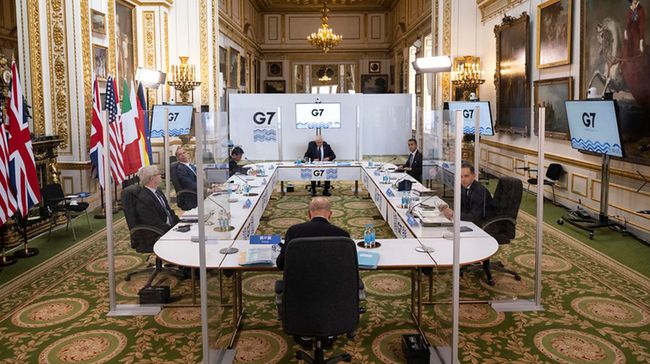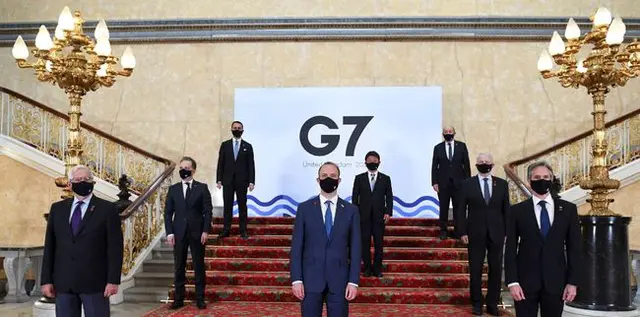Author: Prof. Engr. Zamir Ahmed Awan, Sinologist (ex-Diplomat), Editor, Analyst, Non-Resident Fellow of CCG (Center for China and Globalization), National University of Sciences and Technology (NUST), Islamabad, Pakistan. (E-mail: [email protected]).
British Foreign Secretary Dominic Raab hosted the G-7 Foreign and Development Ministers' Meeting in London on 3 to 5 May 2021. The Group of Seven (G-7) is an intergovernmental organization consisting of Canada, France, Germany, Italy, Japan, the United Kingdom, and the United States. The Group (G-7) was emerged to facilitate shared macroeconomic initiatives by its members in response to the collapse of the exchange rate in 1971, during the time of the Nixon shock, the 1970s energy crisis, and the ensuing recession. The group is contributing almost half of the global net wealth and GDP. In March 2014, Russia was suspended by G7 members from the political forum G8 following the differences on the Crimea issue. After the suspension in January 2017, the Russian Federation decided to leave the G8 permanently. It was confirmed in June 2018.
The recent meeting was attended by all G-7 member countries and Australia, India, the Republic of Korea, South Africa, the Chair of the Association of Southeast Asian Nations, and the High Representative of the European Union, as guests on the special invitation of the UK.
Many issues came under discussions and especially the emerging geopolitics. However, China was one of the hot topics under discussion. At the end of the meeting, a Joint Communiqué was released (https://www.gov.uk/government/publications/g7-foreign-and-development-ministers-meeting-may-2021-communique/g7-foreign-and-development-ministers-meeting-communique-london-5-may-2021) which was agreed upon by all member countries. Para #13, 14, 15, 16, 17, and 18 were issued regarding China.
Based on a joint statement, it is obvious the gap between China and G-7 is growing and, to some extent, worrisome. The meeting's primary task was to strengthen the alliance against China and take collective actions to counter China. The danger of deterioration in geopolitics is very much visible.

There all possibilities that China may face direct threats in the South China Sea, or Taiwan Straight, or with any neighboring or regional state, or in any other mode, like restriction or sanctions, to resist China's rise. However, China has surpassed the threshold, where any other nation can coerce it. But the further development might not be so smooth as the last four decades.
It is predicted that International interference on the Hong Kong issue and Taiwan's reunification may increase. Blaming China for Human Rights in Xinjiang and Tibet may be used as a tool to pressurize China. Chinese participation in International organizations may be monitored or face limitations and restrictions. Chinese international influence may face challenges or be undermined. Chinese exports may face strict laws or a new type of restrictions. Chinese nationals also may face difficulties for international travel.
Western media may enhance its drive to malign China and bombard with fake news, anti-China sentiments, and misinformation. It is well understood that Western Media is dominating world opinion. They might promote an anti-China narrative more systematically.
Chines are well aware of all such threats and are capable of facing them or dilute them. China has attained a stage where it can neutralize such challenges and can counter them conveniently. Friendly countries will support China and stand with China at any difficult moment. The future is China, and no power in the world can resist China's rise to superpower.
This meeting will have a deep impact on the future course of action from both sides. All preventive measures must be in place by Chinese experts and policymakers. China may further cement its relations with Russia, Iran, Turkey, and Pakistan in the days to come. There is a dire need further to strengthen SCO, BRI, and regional alliances.
India used to be a traditional Russian-ally, and the country in South Asia is entirely in the anti-China camp, either it is "Quad" or G-7, and can not be trusted anymore. However, the Indian minister who attended the meeting and had close interaction with few leaders found Coronavirus test positive with Indian variant, which is highly contagious and fatal. He is in quarantine in the UK for two weeks. How many people are infected by him? Time will tell the impact. But it is confirmed that the Indian variant has reached the UK. Due to its aggressive and expansionist policies, India has spoiled its relations with all of its neighbors and depending on friends far away like the US. But the US had not enough supported India when the tension was at peak between China and India in the Ladakh region, nor during the worst situation of the Pandemic. India has been isolated in the region already, and friends far away are also not sincere with her.
(ASIA PACIFIC DAILY)
 简体中文
简体中文

